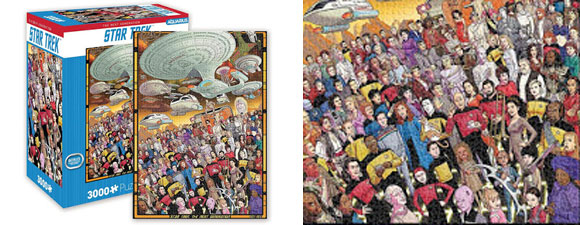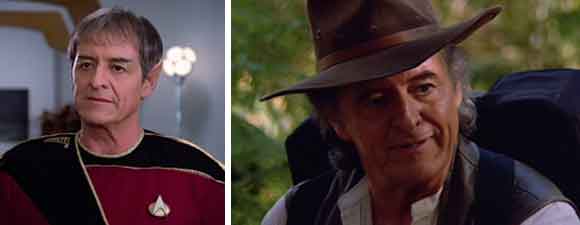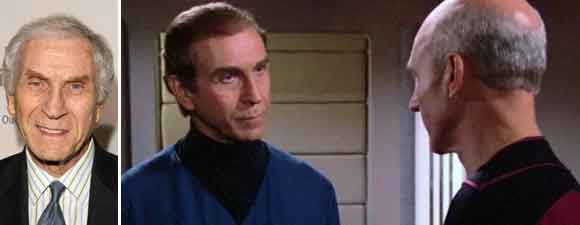Retro Review: Conundrum
7 min readSuffering from amnesia about their names and backgrounds, the Enterprise crew members must nonetheless figure out their role in the war they’re fighting.
Plot Summary: While searching for signs of intelligent life in the Epsilon system, the Enterprise is scanned by an unknown probe that can penetrate their shields. Moments later, no one on the bridge has any memory of their personal lives or backgrounds, though they all remember how to perform their jobs aboard the ship. Worf assumes that because he wears a Klingon sash, he must be the commander, and orders the ship prepared for battle. Data believes that he is the bartender, since he was in Ten Forward when the scan erased his memories. Riker and Ro Laren search the ship on foot in case there are boarding parties present, and learn that all crewmembers are in the same condition as the bridge crew. They also begin to flirt. LaForge is able to access the crew manifest and discovers that Picard is in command, Data is the operations officer, Riker the second officer and Keiran MacDuff the executive officer. LaForge also extracts the ship’s mission from the computer, which is to destroy the central command base of the Lysian Alliance, a genocidal race at war with the United Federation of Planets. The Enterprise must cross into Lysian space, destroying any enemy vessel it encounters on the way and avoiding all outside communication lest they should reveal their position. When the Enterprise encounters a Lysian ship, Picard complies uneasily with MacDuff’s insistence that they should refuse to answer its hail, and when the ship fires, the Enterprise destroys it with a single blast. While Riker struggles with confusing feelings toward both Ro and Troi, each of whom insists she feels an attraction that suggests a prior relationship, Picard examines his growing misgivings about being sent to destroy an enemy he doesn’t know. MacDuff tells Worf that it’s obvious the two of them are the true warriors on the ship and implies that he expects Worf to follow MacDuff’s orders rather than Picard’s if the captain should hesitate. When the Enterprise reaches the Lysian command base, Data finds that it has few weapons though there are thousands of people housed there. After Picard refuses to destroy them, MacDuff orders Worf to fire, then tries to take over Worf’s console. Together, Riker and Worf bring down MacDuff, whom they can now see is not human. As Crusher begins restoring the crew’s memories, Picard learns that MacDuff is a Satarran – an alien race currently at war with the Lysians, with limited weapons capability but great skill at mental manipulation. Riker is unnerved to find Ro and Troi laughing together and confesses to being confused, to which Troi replies that he knows where her office is.
Analysis: Like “The Naked Now” and several others, “Conundrum” is an episode in which the viewer knows more than the crew does…in this case, because we all recognize at once that that Keiran MacDuff guy doesn’t belong on the bridge of the Enterprise. Yet there are so many other unanswered questions that it’s fun to watch them come up one by one. First, is MacDuff directly responsible for the position the crew finds itself in, or is he as confused as they are about who he is and what he’s supposed to do? Second, what was the point of erasing everyone’s personal memories yet leaving them all the skills they need to do their jobs…in other words, the traits that make them capable of unraveling the situation even without remembering the truth? And finally, will this be the time that Riker and Troi figure out they’re perfect together even when they’re working together, or will the writers drag out that particular possibility until there are no more episodes? (Sadly, that last one is the easiest to predict.)
All joking aside, there’s plenty of fun in “Conundrum,” one of many excellent bottle episodes during The Next Generation‘s later seasons that relies on already established character traits and relationships rather than any sci-fi drama to hold the audience’s interest. What a brilliant idea to put the crew in a position where nobody knows who the captain is! Now we really get to see why Picard is the ideal man for the job. Sure, Riker’s getting everyone organized and Worf’s on top of the potential hazards right away, but Picard is the one focused on the big picture from the start. He knows that who they are is less important than whether they get along and cooperate with each other; he knows that all the technology at their disposal is meaningless unless they can be certain it’s working properly; he knows that orders to kill should be questioned, and questioned again, until the person commanded to carry out those orders is certain that there is no other option. It’s fascinating to see how easily the crewmembers take on their typical roles even before they know what titles go with those roles – LaForge can’t wait to look at the computer core, Riker wants to do something, Troi keeps a large group of people calm. Normally I’d expect Data to wonder a bit more quickly why his capabilities are being wasted on tending bar, but he can’t see the bridge from Ten Forward so maybe he has no sense of belonging anywhere else. We can see at the start of the episode that he’s doubting his intuitive skills, considering that Troi can beat him at chess the way Kirk used to beat Spock, using insight rather than logic.
As for Ro and Riker, that subplot is completely gratuitous but it’s also quite fun. When we first see them, they’re having a shouting match in a turbolift about the fact that she made changes – good changes – in the flight handing assessments without asking him first. The next time we see them together, he’s reinforcing her desire to go fix things after everyone’s memories have been erased; unsurprisingly, perhaps, Ro is less agitated than usual, having had the situation with Bajor and her courtmartial wiped from her mind. They start flirting almost immediately, something we often see from Riker but never from Ro, and again it’s somehow unsurprising that she starts it. When Troi tells Riker that she feels an immediate connection, he seems to share it even though he doesn’t have the same hint of a past emotional bond; he’d be perfectly willing to pursue it, but when Ro invades his quarters and his bed as if she belongs there, he accepts that, too, as a possibility worth exploring. Even after he has good reason to believe he has had an intimate bond with Troi, he lets her walk away to pursue the more immediate pleasures offered by the possessive Ro. It’s a bit of a letdown and completely in character at the same time.
I find it a stretch to believe that aliens with the technology to disguise themselves as humans, and to alter not only stored memories but stored computer records in a matter of seconds, have never developed powerful weapons, particularly if they’ve been at war for decades. We don’t get any indication that MacDuff is a shapeshifter since the phaser reveals a “true” form; did he know that might happen when he chose a Starfleet vessel and its weapons to hijack for his own purposes? Obviously we’re supposed to dislike MacDuff, for embarrassing the crew as well as for manipulating them into killing people, but it does occur to me to wonder about his people. The initial reports on the Lysians are that they’re genocidal. If the Satarrans have never built even defensive weapons on a par with their spacefaring and computer technologies, does that mean they were a peaceful people before the Lysians came along? It’s hard to imagine they started this war if they’re so ill-equipped to fight it.
The alien conflict is really only a side note to “Conundrum,” however, so much so that the designers didn’t even bother to build a new central command base but recycled the “God” prop from “Justice.” This story is about how naturally the senior crewmembers of the Enterprise fulfill their assigned duties even when they can’t remember precisely what those duties are, and how not even a toxic outsider can disrupt their innate sense of purpose and cooperation for long. It’s very satisfying to see how much these people like and respect each other when they have no more than instinct to go on, and how it doesn’t take long for MacDuff to offend even Worf with his insistence on a violent approach to an unknown situation. While Riker may be right that war always feels wrong but is sometimes necessary for survival, Troi is also right to believe that everything about this one, in which they’re all just following orders, makes it necessary to stop and think before they act. I’ll take a leader who needs a moral context to justify violent actions every time over one who promises to keep me safe no matter whose personal or social ethics get destroyed in the process.






